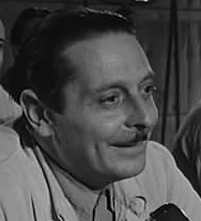Alessandro Blasetti
Alessandro Blasetti | |
|---|---|
 Alessandro Blasetti (1951) | |
| Born | 3 July 1900 |
| Died | 1 February 1987 (aged 86) Rome, Italy |
| Occupation | Film director |
| Years active | 1917-1981 |
Alessandro Blasetti (3 July 1900 – 1 February 1987) was an Italian film director and screenwriter who influenced Italian neorealism with the film Quattro passi fra le nuvole. Blasetti was one of the leading figures in Italian cinema during the Fascist era. He is sometimes known as the "father of Italian cinema" because of his role in reviving the struggling industry in the late 1920s.[1]
Early life
Blasetti was born in Rome, where he also died. After studying law at university, Blasetti chose to become a journalist and film critic. He worked for several film magazines and led a campaign for national film production, which had largely ceased by this point.[2] In 1919 he made a brief foray into acting when he appeared as an extra in Mario Caserini's Tortured Soul.
Director
In 1929 Blasetti made his directoral debut with Sun, a fictional story set against the ongoing draining of the Pontine Marshes. The film was well received at a time when there were few Italian films being made. Benito Mussolini described it as "the dawn of the Fascist film".[3] Like many of his early productions, it had elements that were a precursor to neorealism.
The strong reception for Sun, led to Blasetti receiving an offer from Stefano Pittaluga, the only significant commercial producer left working in Italy at the time. Pittaluga had recently converted his Rome studios for sound films. Blasetti directed what would have been the first Italian sound film Resurrection, but delays meant that it was released after Gennaro Righelli's The Song of Love.[4]
In 1934 Blasetti directed the play 18 BL a "mass theatre" performed outdoors with 2,000 amateur actors.[5]
Blasetti was a driving force in the revival of the Italian film industry in the 1930s, having lobbied for greater state funding and support. One outcome was the construction of the large Cinecittà studios in Rome.
Later life
He played himself in Luchino Visconti's film Bellissima starred by Anna Magnani, a Roman mother who desires to make her daughter a filmstar in Cinecittà where Blasetti makes the screen test for the child actors.
He was President of the Jury at the 1967 Cannes Film Festival. His 1969 film Simón Bolívar was entered into the 6th Moscow International Film Festival.[6]
Selected filmography
- Sun (1929)
- Nerone (1930)
- Resurrectio (1930)
- Mother Earth (1931)
- The Table of the Poor (1932)
- Palio (1932)
- The Haller Case (1933)
- 1860 (1934)
- The Old Guard (1934)
- Aldebaran (1935)
- The Countess of Parma (1936)
- Ettore Fieramosca (1938)
- Un'avventura di Salvator Rosa (1940)
- La corona di ferro (1941)
- The Jester's Supper (1942)
- Quattro passi fra le nuvole (1943)
- Un giorno nella vita (1946)
- Fabiola (1949)
- Prima comunione (1950)
- Altri tempi (1951)
- Peccato che sia una canaglia (1954)
- A Slice of Life (1954)
- La fortuna di essere donna (1956)
- Europa di notte (1959)
- Three Fables of Love (1962)
- Liolà (1963)
- Io, io, io... e gli altri (1966)
- Simón Bolívar (1969)
References
Bibliography
- Balfour, Michael. Theatre and War, 1933-1945: Performance in Extremis. Berghahn Books, 2001.
- Moliterno, Gino. Historical Dictionary of Italian Cinema. Scarecrow Press, 2008.
- Reich, Jacqueline & Garofalo, Piero. Re-Viewing Fascism: Italian Cinema, 1922 to 1943. Indiana University Press, 2002.
